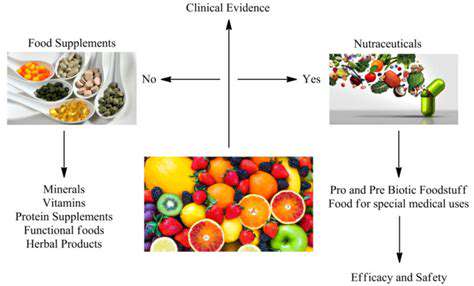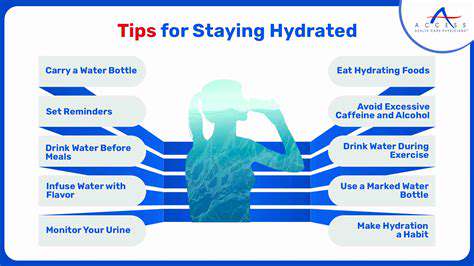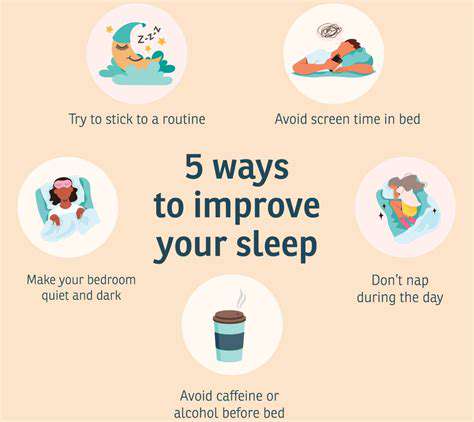Best Tips for Staying Hydrated Daily
Hydration and Your Diet: The Synergy
Hydration's Crucial Role in Digestive Health
Proper hydration is paramount for a healthy digestive system. Water acts as a lubricant, facilitating the smooth movement of food through the intestines. Insufficient water intake can lead to constipation, bloating, and discomfort. Staying adequately hydrated helps maintain the consistency of stool, preventing issues like hard, dry stools. Furthermore, water is essential for the proper functioning of digestive enzymes, which break down food for absorption. A well-hydrated body is a more efficient digestive system.
Maintaining a consistent hydration schedule, particularly with meals and between meals, can significantly impact digestive regularity. Drinking water before, during, and after meals can help with the overall digestive process. This can also assist in preventing indigestion and other digestive issues.
The Impact of Hydration on Nutrient Absorption
Adequate hydration is essential for the body to absorb nutrients effectively. Nutrients from the food we eat are transported throughout the body via blood, which is largely composed of water. When we're dehydrated, the blood thickens, reducing its ability to carry these vital nutrients to cells. This can lead to deficiencies and hinder the body's ability to utilize the nutrients it needs for optimal function.
The proper hydration of our bodies ensures the efficient absorption of vitamins, minerals, and other essential components from our diet. This process is crucial for overall well-being and can directly influence our energy levels and bodily functions.
Water's Influence on Weight Management
Water plays a significant role in weight management, often overlooked. It can help you feel full, reducing the likelihood of overeating. When you're dehydrated, your body may mistake thirst for hunger, leading to unnecessary calorie consumption. Staying hydrated can help regulate appetite and promote a feeling of fullness, thus supporting weight management goals.
Drinking water before meals can create a sense of satiety, potentially reducing the amount of food consumed. This can be a helpful tool in managing calorie intake and maintaining a healthy weight.
Hydration's Effect on Energy Levels
Many people often mistake fatigue for hunger, but dehydration can also significantly impact energy levels. Dehydration can lead to a decrease in physical and mental performance. Water is crucial for transporting nutrients and oxygen throughout the body, fueling cells and supporting energy production. When you're adequately hydrated, you'll likely experience increased energy levels and improved cognitive function.
Hydration and Skin Health
Water is fundamental to maintaining healthy, glowing skin. It helps to keep the skin hydrated, plump, and supple, preventing dryness and wrinkles. Proper hydration helps flush out toxins, promoting a clearer complexion. Drinking plenty of water can improve skin elasticity and reduce the appearance of fine lines and wrinkles. Water is essential for the overall health and appearance of our skin.
Hydration and Exercise Performance
Proper hydration is crucial for optimal exercise performance. When we exercise, we lose fluids through sweat. Replenishing these fluids is essential to prevent dehydration, which can lead to fatigue, decreased performance, and potential health risks. Staying properly hydrated during and after exercise supports muscle function, improves endurance, and aids in recovery.
Adequate hydration is essential for maintaining electrolyte balance, which is critical for muscle function and preventing cramps during physical activity. Proper hydration is vital for supporting the body's overall function during and after exercise.
Read more about Best Tips for Staying Hydrated Daily
Hot Recommendations
-
*Guide to Managing Gout Through Diet
-
*Best Habits for Financial Well being
-
*How to Build a Routine for Better Mental Health
-
*How to Eat Healthy on a Budget [Tips & Meal Ideas]
-
*Guide to Practicing Self Acceptance
-
*How to Incorporate More Movement Into Your Day
-
*Guide to Managing Chronic Pain Naturally
-
*Guide to Building a Reading Habit for Well being
-
*Top 5 Weight Loss Supplements That Actually Work
-
*Best Exercises for Postpartum Recovery [Beyond Abdominal Work]





![How to Start Lifting Weights at the Gym [Beginner Guide]](/static/images/26/2025-05/SettingRealisticGoalsandExpectations.jpg)





